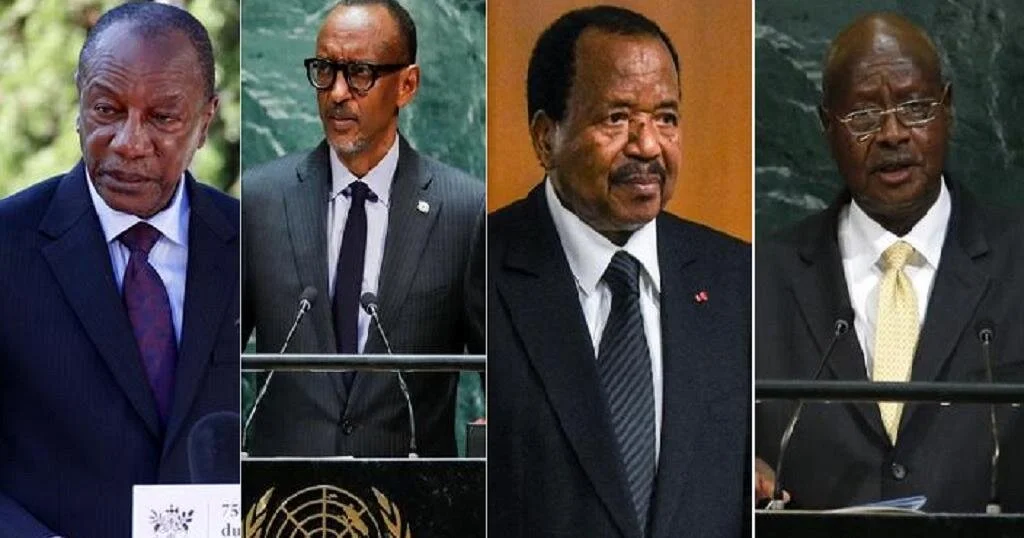A quarter of Africa’s 54 leaders have been in power for more than twenty years. To reach that milestone they have all either evaded or never had to bother with presidential term limits. And this trend has picked up steam. Since 2015, thirteen African incumbents have evaded term limits, reversing a two-decade trend of gradually expanding respect for term limits prior to this period.
This erosion of term limit norms is a problem. In a recent analysis, Candace Cook and I highlight that the erosion of term limits does not happen in isolation, but is part of a broader pattern to weaken democratic checks and balances and evade the rule of law. In fact, once leaders have debilitated judicial and legislative institutions sufficiently to prolong their constitutionally limited time in office, there is little that stands in their way for further abuses of power.
And this is typically what happens. Countries where African leaders have evaded terms are significantly less democratic, more corrupt, and conflict-prone compared to African countries where term limits have been upheld.
Seen in this way, the erosion of term limits is a linchpin to democratic deterioration in Africa. Reasserting term limit norms, therefore, needs to be a focal point for democracy promotion efforts on the continent.
The erosion of term limit norms since 2015 is an outcome of term limited leaders calculating that domestic checks and balance are too weak and that international actors are too indifferent to stop the incumbent’s power grab. In other words, the costs to these leaders are just not high enough to stop them from trying.
A priority for democracy advocates, then, is to dramatically ratchet up these costs. There has been domestic organized resistance to the evasion of term limits in every African country where this has occurred since 2015. Citizens are invariably working against a stacked deck dealt by the ruling executive, though. It is crucial for regional and international democratic actors, thus, to do more to support citizens attempting to protect their democratic rights — and their gains — to make it more costly for incumbents to even try to evade term limits.
This can take a variety of escalating steps, from public warnings to sanctioning key individuals and their families, to cutting off non-humanitarian assistance and discouraging private investment given the deterioration in the rule of law and the likelihood of increased instability. Blocking access to international financial networks and withdrawing recognition of these governments are also options.
Evading term limits must be treated as a red line by regional and international democratic actors. And there needs to be severe, predictable costs if incumbents cross this line. In Africa, the regional and international democratic community has taken its eye off the term limit ball in recent years. They may rationalize that evading term limits is a domestic issue, a legal issue to be decided by the courts, or that there is a trade-off between security and democracy. Experience shows, however, that evading term limits is all about the abuse of political power and hijacking the democratic process. These regimes become increasingly unstable and anti-democratic over time. This outcome has regional and international implications, not just domestic.
Absent strong pushback, Africa is on track for a return to de facto presidencies for life and one-party rule.
Countries in transition are priority targets for reinstituting term limit norms. The Gambia, Ethiopia, Somalia, and Libya have all made halting steps toward democracy in recent years. None of them currently have term limits. So, getting these on the books as a demonstration of democratic commitment will be key. Sudan and Mali are military governments with established deadlines to yield power to elected civilian leaders. These transitional governments should be held accountable for upholding these timeframes. Increasingly autocratic leaders in Benin and Zambia have been angling to sidestep term limits to further consolidate their authority and prolong their rule. These represent additional focal points for democracy advocates.
Term limits are about regularizing succession processes. The decision to depart after two terms is not left to the discretion of the incumbent leader, but is made a preordained legal stipulation. By upholding term limits, African countries not only remove a key source of instability, but they also mitigate against predatory governance systems that all too often emerge when leaders stay in power beyond their two term mandate.
Joe Siegle is the Director of Research at the Africa Center for Strategic Studies. You can follow on Twitter at @AfricaACSS
DISCLAIMER: The views expressed in this publication are those of the author and do not necessarily reflect the views of Vanguard Africa or the Vanguard Africa Foundation.

